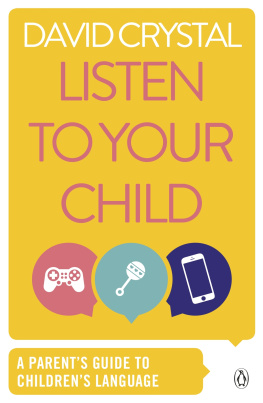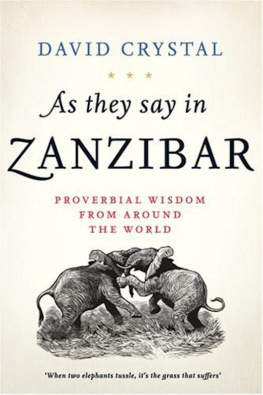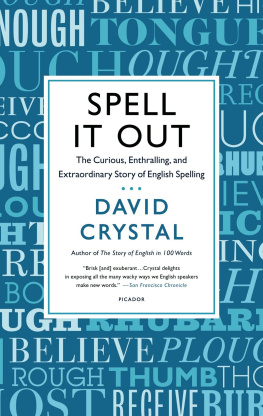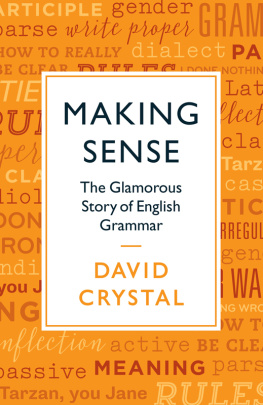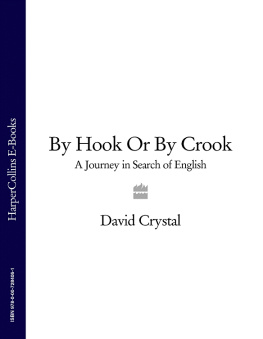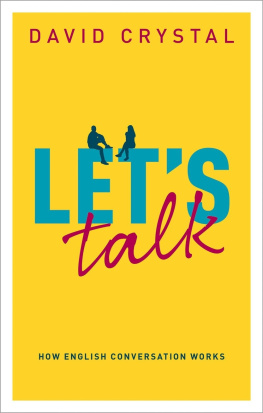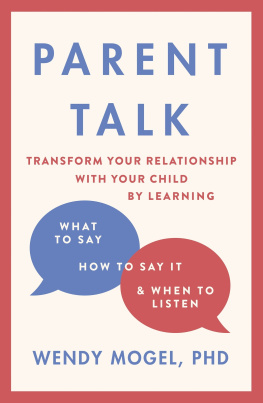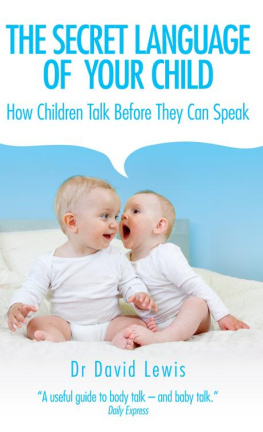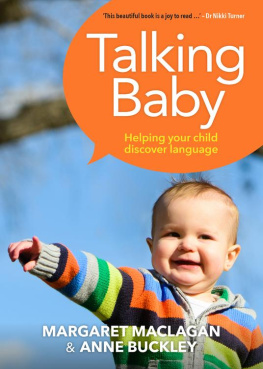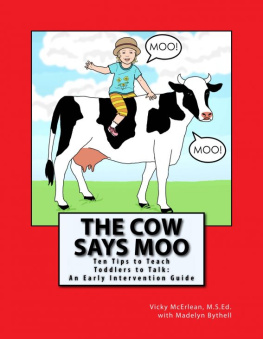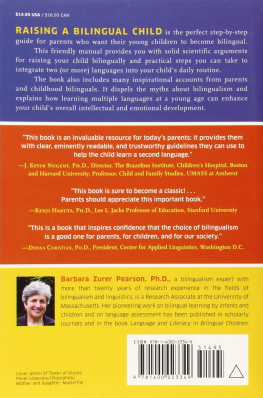PENGUIN BOOKS
LISTEN TO YOUR CHILD
David Crystal was born in 1941 and spent the early years of his life in Holyhead, North Wales. He went to St Marys College, Liverpool, and University College London, where he read English and obtained his Ph.D. in 1966. He became lecturer in linguistics at University College, Bangor, and from 1965 to 1985 was at the University of Reading, where he was Professor of Linguistic Science for several years. He is currently Honorary Professor of Linguistics at the University of Wales, Bangor, but works from his house in Holyhead as a writer, lecture and broadcastesr. His research interests are mainly in English language studies, and he has been much involved with the clinical and remedial applications of linguistics in the study of language handicap. In 1995 he was awarded an OBE for services to the English language, and in 2001 was made a fellow of the British Academy.
David Crystals recent books include The Disappearing Dictionary: A Treasury of Lost English Dialect Words, Spell It Out: The Singular Story of English Spelling, Making a Point: The Pernickety Story of English Punctuation, The Gift of the Gab: How Eloquence Works, The Oxford Dictionary of Original Shakespearean Pronunciation, Making Sense: The Glamorous Story of English Grammar, The Story of Be: a Verbs-Eye View of the English Language, We Are Not Amused: Victorian Views on Pronunciation as Told in the Pages of Punch, and My Life in Words: The Poetry and Thought of John Bradburne. A full list can be found online at www.davidcrystal.com.
David Crystal
LISTEN TO YOUR CHILD
A Parents Guide to Childrens Language
PENGUIN BOOKS
UK | USA | Canada | Ireland | Australia
India | New Zealand | South Africa
Penguin Books is part of the Penguin Random House group of companies whose addresses can be found at global.penguinrandomhouse.com.
First published in Penguin Books 1968
This second edition published 2017
The moral right of the author has been asserted
The cartoons are reproduced by kind permission from Childrens Library by Quentin Blake.
Cover illustrations Shutterstock
Cover design by Madeline Meckiffe
ISBN: 978-0-141-92707-7
Preface to the Second Edition
Although its been over thirty years since the first edition of this book, the research findings I reported have stood the test of time, and are as relevant and interesting today as they were then. The main change in the new edition has been the expansion of the section on bilingualism, as this has been the area where Ive found people have asked most questions, as they participate in an increasingly multicultural global society. Another has been to do with advances in technology: Ive replaced the opening section in the first edition on how to use a tape recorder and edit a tape, as in a digital world this is now technical archaeology for virtually everyone. The advent of new recording devices and computer storage has certainly made the task of keeping a record of childrens speech a lot easier; but one still needs to listen carefully. Ive also updated the section on further reading.
David Crystal
Holyhead, 2017
1
Beginning at the Beginning
Consider Susie.
Susie is 0 years, 0 months, 0 days, and 1 minute old. Life has been quite fraught recently, and theres been a lot of noise about mainly hers. But now its time to settle down and take in something of the world around. There is a lot to feel, to smell, to taste, to see and, above all, to hear.
Susie saw nothing of what was going on, in fact, for her eyes were tightly shut for the first few minutes of her birth day. But during that time, she had the chance of hearing around her:
over a hundred utterances, containing in total
over 500 words, containing in total
over 2,000 vowels and consonants.
They were utterances such as these:
Its a girl, Mrs Smith!Put that on there, will you?
Oh, isnt she gorgeous!Youre lovely, you know that?
OK, Ive got her.Another one, please, nurse.
Once she had stopped crying, there was no way she could shut these sounds out apart from falling asleep (which came half an hour later) or putting her fingers in her ears (which came two years later). That is the peculiar power of sound, compared with vision. You cannot shut your ears, as you can shut your eyes.
Susie has evidently been born into an English-speaking community, so, if she stays within it, she will have to learn the grammar, vocabulary, and pronunciation of many utterances of this kind. To be precise, if she is going to end up speaking the same language as her parents, she needs to learn the following:
the 20 vowels and 24 consonants of the spoken language, and over 300 ways of combining these sounds into sequences (e.g. s + p + r can be combined in such words as spring);
an adult-speaking vocabulary of around 50,000 words, and an ability to understand the vocabulary of others that may be twice as great;
over 1,000 rules of grammar, which will tell her how to string words together to make acceptable sentences.
Punch, 5 October 1983
If she had been born into any other language community, things would not have been very different.
Susie has quite a language-learning task in front of her. How will she get on?
Let us jump ahead in time, in the way that only authors can. Susie was tape-recorded talking to her baby-sitter one afternoon in December, when she was four years seven months old. 1,671 days old, to be precise. Shes been awake for about 20,000 hours during that time, but only a fraction of this time has been devoted to talking probably less than a tenth in all. Nonetheless, from one part of the recording came the following remarkable narrative. (Pauses are marked by .)
Susie: Oh, look, a crab. We seen we were been to the seaside.
Baby-sitter: Have you?
Susie: We saw cr fishes and crabs. And we saw a jellyfish, and we had to bury it. And we we did holding crabs, and we we holded him in by the spade.
Baby-sitter: Did you?
Susie: Yes, to kill them, so they wont bite our feet.
Baby-sitter: Oh.
Susie: If you stand on them, they hurt you, wont they.
Baby-sitter: They would do. Theyd pinch you.
Susie: Youd have to and we put them under the sand, where the sea was. And they were going to the sea.
Baby-sitter: Mhm.
Susie: And we saw some shells. And we picked them up, and we heard the sea in them. And we saw a crab on a lid. And we saw lots of crabs on the sea side. And I picked the fishes up no, the shells, and the feathers from the birds. And I saw a pig.
Baby-sitter: Gosh, that was fun.
Susie: Yes, and I know a story about pigs.
Baby-sitter: Are you going to tell it to me?
Susie: One one day they went out to build their houses. One built it of straw, one built it of sticks, and one built it of bricks. And he the little busy brother knowed that in the woods there lived a big bad wolf, he need nothing else but to catch little pigs. So, you know what, one day they went out and the wolf went slip slosh slip slosh went his feet on the ground. Then let me see, er now I think he said let me come in, you house of straw. And he said, no no by my hair of my chinny-chin-chin, I will not let you come in. Then Ill huff, and Ill puff, and Ill puff, and Ill blow your house down. So he huffed, and he puffed, and he puffed, and he puffed, and he blew the little straw house all to pieces. Then away went the little brother to his brothers house of sticks

